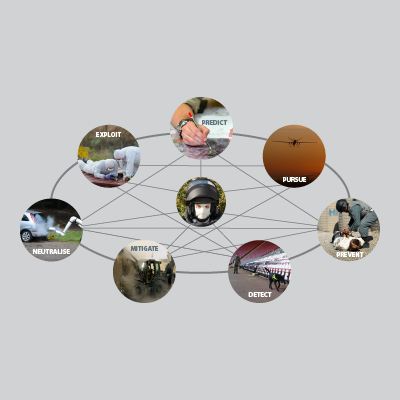Determination of the risk to people and infrastructure following an explosion is predicated on the ability to accurately predict blast load parameters, such as pressure and impulse, often at multiple points of interest. Terrorist events are, by their very nature, unpredictable, and therefore it is prudent for analysis tools to embrace this uncertainty, typically by considering many different configurations of input parameters (e.g., bomb size, location, composition…). Clearly, these tools should return the results from hundreds to thousands of permutations in a reasonable time, which emphasises the need for quick-running methods. However, existing tools are not sophisticated enough to generate reliable loading predictions in complex environments (e.g. crowded internal spaces, cityscapes). This talk presents ongoing work by the speaker and colleagues at the University of Sheffield in developing the next generation of quick-running approaches to predict complex blast loading.
The Terrorism Risk Assessment, Modelling and Mitigation Seminar Series (TRAMMSS) is a virtual seminar series focused on technical topics related to terrorism risk assessment, and modelling, including blast modelling and response; IEDs; vehicles as weapons; CBRN; big data for risk assessment, security and screening; and associated mitigation measures.
Speakers
Dr Sam Rigby is a Senior Lecturer in Blast & Impact Engineering in the Department of Civil & Structural Engineering at the University of Sheffield. Dr Rigby has over a decade of experience in the development and use of novel experimental techniques for quantification of blast loading, and the use of analytical and numerical tools to derive fast-running, engineering-level approaches for blast parameter prediction. In particular, Dr Rigby’s work focusses on developing an understanding of the fundamental mechanisms governing blast loading in complex environments, from which more robust predictive approaches can be developed. Dr Rigby has been a named researcher on over £3M of research council funding in the past 5 years and has worked closely with Dstl and UK MoD in developing best-practice for experimental testing of vehicles against buried explosives, and the design of curtain-wall glazing systems against blast loading.
Who should attend
This seminar is open to guests from outside Cranfield, who may work in academia, research, or industry. Due to the potentially sensitive nature of this seminar series, guests should be able to show that they are affiliated with an appropriate bona fide organisation.
Concessions
The event is free of charge, but participants must register for the TRAMMSS mailing list in advance.How to register
To attend this seminar, you must register for the TRAMMSS mailing list via the form here.






